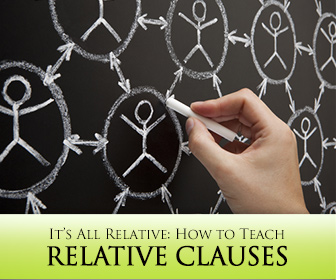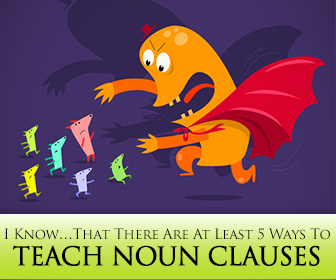It’s All Relative: How to Teach Relative Clauses and Why You Need To


This is an advanced grammar concept that students will need ample practice with to master. It’s a form that experienced students are most likely already using, but they may not be doing so consciously with intention or awareness. Teachers should start by giving students examples in-text or by providing a list. From there, it’s time to practice using them in context.

Most students are, of course, more open to using new grammar when it’s framed in a fun and interactive way. Noun clauses are often used in writing, and students will definitely need to practice this form in a variety of ways, but it may be best to begin practice through the use of speaking tasks. One activity that can be used is a group interview using note cards with questions on them. Students can use a list of teacher-created examples to help them form answers to the questions orally using sentences that include noun clauses. It’s necessary to provide questions that will elicit responses that will require the use of noun clauses. For example:
Question: “What did your mother tell you when you left for the United States?”
Answer: “She said that…….”
Question: “What do you know about New York City?”
Answer: “I know that….”
Question: “What have you learned about noun clauses?”
Answer: “I have learned that….”
Because noun clauses are used for reported speech in English, having students complete tasks that require them to recount a dialogue is a useful way of having them put their knowledge of noun clause structures to use. By having groups of students in a class develop and perform silly skits, an opportunity is created for this kind of practice. Students can watch their peers perform a fun scene and then recount the story in speaking, or even better, in writing, using noun clauses. Like with any grammar task, be sure to provide students to help get them started, both for those developing the dialogue and for those who will be reporting what they saw.
One of the language tasks that relies heavily on the proper use of noun clauses is paraphrasing. If noun clauses are being taught in a writing course that also includes paraphrasing, it is ideal to teach these two together. As students develop their proficiency around using noun clauses, their paraphrasing abilities will be strengthened and their capacity to clearly convey the meaning of an original passage will increase.
Reported speech is often used in written news reports, and creating activities that incorporate this kind of writing will help students to connect noun clauses to real life. Newspaper articles can be used initially as reading material that students can use as an opportunity to find examples of noun clauses, or later on, after students become more familiar with the form and function, they can write their own news reports of real events happening around the school or the community.
For the advanced class, using song lyrics with embedded noun clauses is a challenging and enjoyable activity. Many song lyrics have layers of noun clauses that are used in poetic and creative ways that we don’t often hear or use in everyday language. While this may not be the best form of practice when time is limited, for those students with an appetite for grammar, dissecting the complex structures often found in song lyrics will provide a great mental workout, and students will walk aware with better awareness of the recursive nature of clauses in English.
Easier to acquire than some other types of clauses (i.e. adjective clauses), noun clauses are essential form for writing students, especially, to gain solid proficiency in using. As is true of all grammar forms, students will learn best with interactive, integrated lessons that provide students with the opportunity to practice all four of the skills: reading, writing, listening, and speaking.